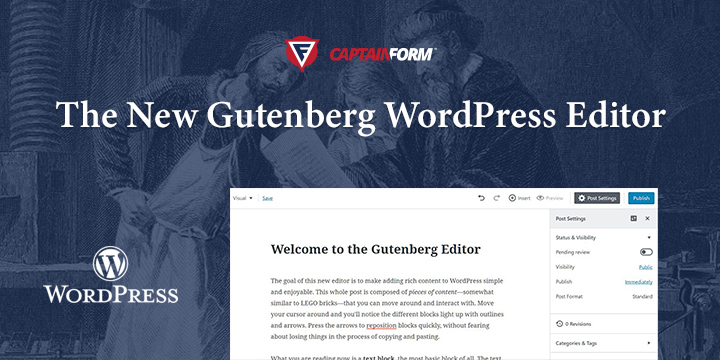WordPress is on the verge of introducing one of the biggest changes to its publishing platform in 15 years: a new content editor called Gutenberg. Not only is it going to be a visual and functional revamp of the Post & Page Editor screen, it also marks a major shift in how we think about content and layout creation with software that is said to power over 30% of the Web.
The main goal of Gutenberg is to create an easier, more intuitive way to add different types of rich content, one that doesn’t require extensive coding knowledge, but is still compliant with web standards and customizable for the more experienced folks. It introduces the concept of content blocks, which modularizes every type of content you wish to insert on a post or page, from something as simple as a paragraph, to complex and custom things like pull quotes, widgets, and 3rd-party embeds.
The other key idea is that the Gutenberg Editor wasn’t just created for article writing, but also for laying out whole pages, to address the more complicated requirements of those who use WordPress as a full-blown content management system.
“These foundational elements will pave the way for stages two and three, planned for the next year, to go beyond the post into page templates and ultimately, full site customization.”
While yes, this is all possible with WordPress right now, you would have to wrangle custom code or install additional plugins. Gutenberg is here to revamp that bit of awkwardness and fully bake these features into WordPress so it feels like you’re not wrestling with the system, just fluidly creating.
With such a big change about to drop, it’s understandable that a lot of confusion may arise in the community, so it’s important get as many answers about Gutenberg out there as possible.
Why is it called Gutenberg?
The new editor is named after Johannes Gutenberg, who ushered in the printing revolution in the West with his invention, the movable type printing press. It’s ambitiously named “for a reason”.
When will I get Gutenberg?
It’s planned to be integrated in to WordPress version 5.0, but there is no definite date on that release yet. At WordCamp EU 2018 in June, Matt Mullenweg outlined some updates on this, such as the next step is to get WordPress.com users opt-in functionality, and pushing for 100,000 installs.
Can I try it out now?
Yes, you can install Gutenberg as a plugin, and you can try writing with it using the demo site, Frontenberg.
Will Gutenberg let me edit posts on the live, front-end part of my site?
No, it’s primarily poised to replace the post/page editor. That said, the concept of blocks introduced by Gutenberg could allow for extensibility and editing in other areas.
Why is Gutenberg necessary? Can I disable it?
Gutenberg will become the new, default way, so yes it’s going to be a necessary thing. But there will be ways to disable it completely, or for certain post types and other conditions.
Will Gutenberg break my site?
The code generated by Gutenberg is all backwards-compatible HTML, so on that level it shouldn’t break things; but there are other aspects where issues can arise, such as the planned changes for custom meta-boxes.
If I use a custom layout plugin, will it become obsolete because of Gutenberg?
Gutenberg is not meant to replace custom layout plugins, but the plugins that start to integrate blocks and Gutenberg features might gain an advantage eventually.
“We realize it’s a big change. We also think there will be many new opportunities for plugins. WordPress is likely to ship with a range of basic blocks, but there will be plenty of room for highly tailored premium plugins to augment existing blocks or add new blocks to the mix.”
How can I update my theme or plugin to ensure compatibility with Gutenberg?
There are a number of guides out there to get your WP theme or WP plugin all prepped for when the big G drops, such as a plugin compatibility testing and a starter theme, as well as how to create blocks.
Admin
Latest posts by Admin (see all)
- CaptainForm deprecation - April 7, 2023
- Survey: How Has The New Reality Impacted You? - June 29, 2020
- The WordCamp Europe Berlin Memories - July 10, 2019

At WP4Good, I published instructions on how you can test you theme(s) with Gutenberg blocks to find out where a theme needs tweaks. https://wp4good.org/how-to-test-our-theme-for-gutenberg/
I appreciate your article, it’s easy to understand and detailed, thank you for sharing.
Awesome blog post, I found all the information mentioned really interesting and justifying the topic of the post and it will help me a lot to know about latest version WordPress.
your topic of WordPress is very informatic for me thanks for sharing your time and post with us…
Awesome blog post, I found all the information mentioned really interesting and justifying the topic of the post and it will help me a lot to know about latest version WordPress.
Thanks your shared!… I hope you will continue to have similar posts to share with everyone! I believe a lot of people will be surprised to read this article!
Very wonderful experience.
Good work keep sharing